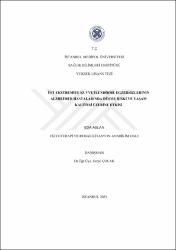| dc.contributor.advisor | Çolak, Serpil | |
| dc.contributor.author | Aslan, Eda | |
| dc.date.accessioned | 2022-01-06T12:24:22Z | |
| dc.date.available | 2022-01-06T12:24:22Z | |
| dc.date.issued | 2021 | en_US |
| dc.date.submitted | 2021-11-03 | |
| dc.identifier.citation | Aslan, E. (2021). Üst ekstremite kuvvetlendirme egzersizlerinin alzheimer hastalarında düşme riski ve yaşam kalitesi üzerine etkisi. (Yayınlanmamış yüksek lisans tezi). İstanbul Medipol Üniversitesi Sağlık Bilimleri Enstitüsü, İstanbul. | en_US |
| dc.identifier.uri | https://hdl.handle.net/20.500.12511/8773 | |
| dc.description.abstract | Bu çalışmada üst ekstremite kuvvetlendirme egzersizlerinin Alzheimer hastalarında (AH) düşme riski ve yaşam kalitesi üzerine etkisi araştırıldı. Çalışmaya 66 hafif ve orta evre AH dahil edildi. Çalışmayı 45 katılımcı tamamladı. Katılımcılar üst ekstremite kuvvetlendirme grubu (ÜG), alt-üst ekstremite kuvvetlendirme grubu (AÜG) ve kontrol grubu (KG) olarak ayrıldı. Müdahale gruplarına 8 haftalık alt-üst ekstremite kuvvetlendirme ve denge egzersizleri uygulanırken, KG günlük yaşam aktivitelerine rutin olarak devam etmiştir. Egzersizler haftanın üç günü ve gün aşırı olacak şekilde fizyoterapist eşliğinde uygulanmıştır. Çalışma Buket Yaşlı Bakım Merkezi'nde yatılı kalmakta olan kişilerde uygulanmıştır. Üst ekstremite kas gücünü ölçmek için katılımcılara ağrılık kaldırma kuvveti uygulanmıştır. Bireylerin kavrama kuvvetini ölçmek için el dinamometresi kullanılmıştır. Alt ekstremite kas gücünü ölçmek için 30 sn otur kalk testi uygulanmıştır. Katılımcıların düşme riskini değerlendirmek için Süreli Kalk-Yürü Testi (SKYT) ve Tinetti Düşme ve Etkinlik Ölçeği uygulanmıştır. Mini Mental Durum Testi (MMDT) katılımcıların bilişsel durumlarını ölçmek için kullanılmıştır. Tinetti Denge ve Yürüme Değerlendirme Testi (TDYDT) katılımcıların yürüyüş ve dengesini ölçmeye yönelik olarak uygulanmıştır. Uygulanan kuvvetlendirme ve denge egzersizlerinin AH'nin yaşam kalitesine etkisini değerlendirmek için Dünya Sağlık Örgütü Yaşam Kalitesi Anketi-Yaşlı Modülü (WHOQOL-OLD) ve Alzheimer Hastalığıyla İlişkili Yaşam Kalitesi (ADRQL) Ölçeği uygulanmıştır. Değerlendirmeler çalışma başlamadan önce, çalışmanın 4.haftası ve 8.haftası tamamlandığında gerçekleşmiştir. Değerlendirme sonuçlarına göre kullanılan testlerde, alt-üst ekstremite kas gücünde ve üst ekstremite kavrama kuvvetinde anlamlı farklılıklar görülmüştür (p<0.05). Sonuçlara göre üst ekstremite kuvvetlendirme ve denge egzersizlerinin AH'de düşme ve yaşam kalitesi üzerine olumlu yönde etkisi olduğu söylenebilir. | en_US |
| dc.description.abstract | In this study, the effect of upper extremity strengthening exercises on the risk of falling and quality of life in Alzheimer's patients (AD) was investigated. A total of 66 mild and moderate AH were included in the study. 45 participants completed the study. Participants were divided into upper extremity strengthening group (UG), lower-upper extremity strengthening group (AUG), and control group (KG). While 8 weeks of lower-upper extremity strengthening and balance exercises were applied to the intervention groups, KG continued with daily living activities routinely. The exercises were applied three days a week and every other day, accompanied by a physiotherapist. The study was applied to people staying in Buket Elderly Care Center. Weight lifting force was applied to the participants to measure the upper extremity muscle strength. A hand dynamometer was used to measure the grip strength of individuals. To measure the lower extremity muscle strength, the 30-second sit and stand test was applied. Timed Up-Go Test (SKYT) and Tinetti Fall and Activity Scale were applied to evaluate the fall risk of the participants. The Mini Mental State Test (MMST) was used to measure the cognitive status of the participants. Tinetti Balance and Gait Assessment Test (TDYDT) was applied to measure the gait and balance of the participants. The World Health Organization Quality of Life Questionnaire-Old Module (WHOQOL-OLD) and Alzheimer's Disease-Related Quality of Life (ADRQL) Scale were applied to evaluate the effect of strengthening and balance exercises on the quality of life of AD. Evaluations were made before the study started, at the end of the 4th and 8th weeks of the study. Significant differences were observed in lower-upper extremity muscle strength and upper extremity grip strength in the tests used according to the evaluation results (p<0.05). According to the results, it can be said that upper extremity strengthening and balance exercises have a positive effect on falling and quality of life in AD. | en_US |
| dc.language.iso | tur | en_US |
| dc.publisher | İstanbul Medipol Üniversitesi, Sağlık Bilimleri Enstitüsü | en_US |
| dc.rights | info:eu-repo/semantics/openAccess | en_US |
| dc.subject | Alzheimer Hastalığı | en_US |
| dc.subject | Denge | en_US |
| dc.subject | Düşme | en_US |
| dc.subject | Kuvvetlendirme | en_US |
| dc.subject | Yaşam Kalitesi | en_US |
| dc.subject | Alzheimer's Disease | en_US |
| dc.subject | Balance | en_US |
| dc.subject | Falling | en_US |
| dc.subject | Strengthening | en_US |
| dc.subject | Quality of Life | en_US |
| dc.title | Üst ekstremite kuvvetlendirme egzersizlerinin alzheimer hastalarında düşme riski ve yaşam kalitesi üzerine etkisi | en_US |
| dc.title.alternative | The effect of upper extremity strengthening exercises on fall risk and quality of life in alzheimer patients | en_US |
| dc.type | masterThesis | en_US |
| dc.department | İstanbul Medipol Üniversitesi, Sağlık Bilimleri Fakültesi, Fizyoterapi ve Rehabilitasyon Bölümü | en_US |
| dc.relation.publicationcategory | Tez | en_US |


















